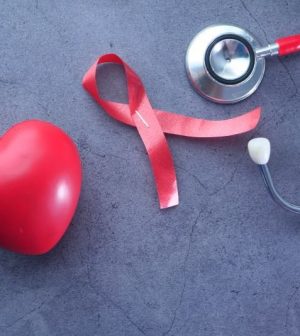- Could Your Grocery Store Meat Be Causing Recurring UTIs?
- Are You Making This Expensive Thermostat Error This Winter?
- Recognizing the Signs of Hypothyroidism
- 10 Strategies to Overcome Insomnia
- Could Artificial Sweeteners Be Aging the Brain Faster?
- Techniques for Soothing Your Nervous System
- Does the Water in Your House Smell Funny? Here’s Why
- Can a Daily Dose of Apple Cider Vinegar Actually Aid Weight Loss?
- 6 Health Beverages That Can Actually Spike Your Blood Sugar
- Treatment Options for Social Anxiety Disorder
Even HIV Patients Without Symptoms May Have Underlying Heart Trouble

People with HIV could have an increased risk of heart disease even if they aren’t suffering any symptoms related to their infection, a new study finds.
Middle-aged people living with HIV were more likely to have early signs of heart disease, with thicker blood vessels placing strain on the heart.
“Prior studies have shown cardiovascular disease in persons living with HIV, however not at such an early stage,” said senior researcher Dr. Ahmed Gharib, director of the Biomedical and Metabolic Imaging Branch of National Institute of Diabetes and Digestive and Kidney Diseases in Bethesda, Md.
The study highlights that as effective drug therapies increase life expectancy for people with HIV, health concerns not related to AIDS are becoming increasingly common.
About 39 million people around the world are living with HIV, the World Health Organization estimates. Since 2010, HIV-related deaths have been reduced by 51%.
Still, recent research has found that people living with HIV have a four-fold higher rate of sudden cardiac death compared with the general population, researchers said in background notes.
To better understand this risk of heart disease, researcher recruited 74 adults living with HIV but without known heart disease. These folks were compared to 25 healthy people who didn’t have either HIV or heart disease.
Everyone underwent an MRI to measure the thickness of their heart blood vessels and an echocardiogram to assess their heart function.
Results showed that the HIV patients had thicker heart blood vessels than the control group. Those thicker vessels were associated with thickening of the left ventricle — one of the lower chambers of the heart — as well as impaired diastolic function within the ventricles.
This stiffening of the heart can lead to heart failure, according to the Cleveland Clinic.
Didanosine, one of the drugs used in HIV treatment cocktails, was associated with the thickness of heart arteries, the researchers said.
The new study was published April 4 in the journal Radiology: Cardiothoracic Imaging.
“The ability to detect early coronary artery disease in persons living with HIV and potentially prevent detrimental effects on the heart muscle is important,” lead researcher Khaled Abd-Elmoniem, a staff scientist in NIDDK’s Biomedical and Metabolic Imaging Branch, said in a journal news release. “This research shows the impact of HIV on developing subtle subclinical coronary artery disease and its effects on heart function.”
By identifying patients with these early signs of heart disease, doctors might be able to intervene and protect their heart health, the researchers said.
More information
The Cleveland Clinic has more on diastolic dysfunction.
SOURCE: Radiological Society of North America, news release, April 4, 2024
Source: HealthDay
Copyright © 2026 HealthDay. All rights reserved.










